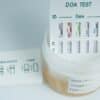These Are The 7 Types Of Drinker: What Type Are You?
Almost everyone will try alcohol at some point in their lives. However, the frequency at which individuals consume alcohol can vary. Some people can go for weeks without consuming any alcohol, while others may find it rare to go a day without a drink. Excessive alcohol consumption can potentially become a concern, so it’s important to understand the different types of drinkers to determine what is a healthy and unhealthy drinking pattern.
Infrequent Drinker
Infrequent drinkers can go for a week or longer without feeling the need to consume alcohol. Some individuals may only drink on special occasions and may consume less than 12 drinks in a year.
Research from Drinkaware in 2019 revealed that 48% of adults reported drinking alcohol at least once a week, indicating that approximately 52% of individuals fall into the category of being teetotal or infrequent drinkers, which is considered the healthiest drinking pattern.
Social Drinker
Social drinkers consume alcohol mainly in social settings and may not drink at home unless they have guests over.
This behavior is generally considered healthy, except if one is socializing excessively or facing pressure to consume large amounts of alcohol regularly.
Moderate Drinker
Moderate drinkers consume alcohol weekly but stay within the recommended guidelines of 14 units per week, equivalent to about 6 pints of beer or 6 medium glasses of wine.
While moderate drinkers may occasionally binge drink, it is not a regular occurrence that could lead to health issues. Monitoring moderate drinking is crucial, as it could escalate to heavy drinking under certain circumstances.
Binge Drinker
Binge drinkers may refrain from alcohol for several days but engage in heavy drinking sessions when they do consume alcohol. They often exceed the recommended weekly alcohol intake in a single day, sometimes even two or three times over.
Binge drinking poses risks to health and can lead to reckless behavior, warranting caution and moderation.
Heavy Drinker
Consuming more than 14 units of alcohol per week categorizes an individual as a heavy drinker, with 32% of men and 16% of women falling into this group.
Heavy drinking is generally unhealthy and can heighten the risk of various health problems, particularly when combined with other unhealthy lifestyle factors. While most heavy drinkers are not alcoholics due to lack of dependence, excessive consumption can potentially lead to alcoholism if continued regularly over 4 drinks per day.
High-Functioning Alcoholic
Transitioning from heavy drinking to alcoholism occurs when physical withdrawal symptoms manifest. Alcoholics often feel the constant need for alcohol and may even drink discreetly or feel guilty about their drinking habits.
Some alcoholics are high-functioning, maintaining a facade of normalcy while handling daily responsibilities. They may even drink to cope with underlying issues and appear to function better while intoxicated. Despite this seeming functionality, this type of alcoholism can still pose health risks. Exploring therapy options such as those provided at The Awareness Centre could be beneficial in addressing and overcoming this form of alcoholism.
Self-Destructive Alcoholic
Self-destructive alcoholics also experience withdrawal symptoms and may engage in secretive drinking. However, their behavior results in more evident negative consequences.
Individuals may be identified as self-destructive alcoholics if their drinking habits lead to damaged relationships, neglect of work and family responsibilities, financial troubles, criminal activities, or risky behaviors. This section outlines additional signs of alcohol abuse and offers guidance on seeking help.


















